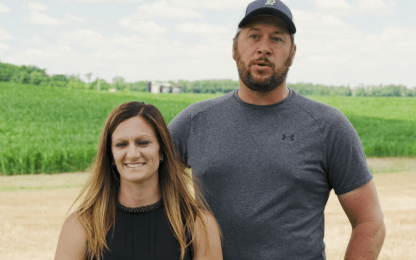Few people are as ingrained in California’s rice industry as the Dennis family.
Over the past 70 years, they built a vertically integrated operation that encompasses the rice process from seed through milling.
A family tradition
“Our father really started it off during the Depression,” says Steve Dennis, who works with his brother, Kevin and the next generation to manage the family’s diversified operation. “He found some land, got a character loan to buy a tractor, and they lived off my mother’s salary until he got going.”
That commitment to farming continued as their father, Linc, added land to their operation and diversified his crops, business practices still followed by Steve and Kevin.
Diversifying crops
In 1998, they started planting almond orchards, and now have almost 1,000 acres of the tree nut under cultivation; more recently they started planting walnuts and plan to expand that crop to 1,000 acres. “This is a significant investment,” Steve, who manages the family’s farming operations, says. “It actually costs more to develop the orchard, buying the trees and putting in irrigation, than to purchase the land.” Steve estimates that it will take 10 to 12 years to repay their investment and start seeing profits, but believes the return will be worth it.
Rice roots remain strong
The most important crop for the Dennis family, though, remains rice. Their 4,500 acres of rice fields are home to 11 different varieties, including medium grain consumers might buy in the grocery store and sticky rice they’ll find in sushi. They also grow rice seed, which they use themselves to start their next year’s crop and also sell to area farmers.
Once the rice is harvested, it’s taken to Depue Warehouse, a drying and storage facility of which the Dennis family owns 92 percent, after Linc purchased his initial interest in 1950. The warehouse operation has also expanded over the years and now consists of seven different locations where they’re able to accept delivery of, and keep separate, the many varieties of rice grown by area farmers.
After a load of rice is delivered, it’s carefully dried before being put into storage silos or flat houses to wait for sale. “Each grower markets his own rice,” Kevin, who manages the warehouse operation, says. “The mill will call us to ask for the quantity they need.” Depue can store 4.3 – 4.5 million hundredweight, or 43 – 45 million pounds of rice. Rounding out their vertical integration, one of Depue’s facilities leases out grounds and buildings that hold a small rice mill, where a few years ago a group of growers got together to mill their rice before selling it, and a hauling company to handle distribution and delivery.
Hard work, diligence, and attention to detail
As to why this family has been so successful over the generations, Steve says it comes down to hard work, diligence, attention to detail, and being progressive-minded. Vint Wurm with Farm Credit Services of Colusa-Glenn agrees, and says, “They’re successful at every level of farming, from growing to managing the drying facility to marketing. From after the Depression and forward, they’re actually a reason why farming in Colusa County has been so successful.”



